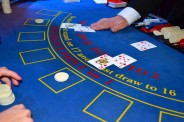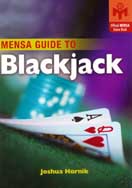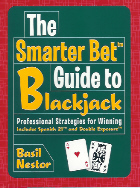
Mensa Guide to Blackjack

Smarter Bet Guide to Blackjack
Vegas-Style Blackjack vs. Atlantic City Rules: How Player Strategy Changes by State
You do not play blackjack everywhere. The game is different between the Las Vegas neon lights and the boardwalk tables of Atlantic City, and can entirely change your strategy. Even Pennsylvania has There are occasions when we here at ReadyBetGo want to bring you interesting facts about the gambling industry When something catches our eye, we will publish it for your enjoyment.
There are occasions when we here at ReadyBetGo want to bring you interesting facts about the gambling industry When something catches our eye, we will publish it for your enjoyment. 
its variant, which sometimes can surprise players with a structure that is friendly toward players. It is these differences that shine a light on your better chances of making a better bet, and trying to make more intelligent bets, no matter where you turn up.
The Rulebook Isn't Universal
The majority of players believe that blackjack is one set of rules in a different decor, which was not the case at all. The rules of the house in any state regulate the way the dealer plays, whether you may surrender, the number of decks used, and the amount of money you receive when you make a blackjack.
Carefully selected offshore casinos often offer rule variations similar to land-based tables in Nevada, New Jersey, or Pennsylvania. They mirror how dealers act on soft 17, whether surrender is allowed, and how payouts are structured, letting players apply state-level blackjack strategies even when playing online.
How then do these differences appear on the table?
Vegas Blackjack (Nevada)
There are blackjack tables everywhere in Las Vegas, but not all of them are created equal. The main difference here is that dealers stand on soft 17, which comprises an Ace card that is treated as 11 (such as Ace-6). This minor regulation increases the advantage of the house since it provides more opportunities to the dealer to upgrade weak hands.
Vegas blackjack typically pays 3 to 2, although short-pay 6 to 5 arrangements are now typical on the Strip. That change alone is capable of increasing the house advantage by more than one per cent, an agonizing disparity to serious gamblers. Six to eight decks are also applied in most games in Vegas, which complicates the inefficacy of card counting.
On the positive side, the Vegas rules are kind and generous with regard to doubling down. You may have the option of doubling on any two cards and frequently splitting as well. In other casinos, surrender is also possible, though not assured. When splitting, it is normally flexible; you can split again to a maximum of three or four hands. However, with Aces, most casinos only allow you one card per Ace.
Due to these reasons, Vegas blackjack is more of a risk management than risk-taking. Players must be a little conservative with dealer Aces or 10s because they know that the dealer has an added opportunity to develop a winning hand out of a soft 17.
Atlantic City Blackjack (New Jersey)
Go over the nation to Atlantic City, and the complexion of the game is changed instantly. In this case, dealers will be at all 17s, regardless of soft 17. That is the one rule that makes the house a little less fortunate, and this offers more opportunity to the players in the long run.
Blackjack in Atlantic City has a staple of the surrender option. It enables you to bet a losing hand early on with half your bet, the dealer not yet having played, before him. This is an option to reduce losses that will otherwise wipe out your stack in hard hands, such as a hard 16 against a dealer 10.
As a rule, eight decks are used in games, and after splitting, a player can double down. Dividing can be made to a maximum of four hands, consisting of three splits all the way, but in reality, you will only receive a single card per split, as in the game of Vegas. The 3 2 payout is also normal throughout New Jersey casinos, which is encouraging to whoever is pursuing justifiable chances.
Atlantic City blackjack also favors players who are more aggressive in their game since the dealer does not hit soft 17 and retreat. You are able to put more borderline hands on, bet twice, and make smarter surrender decisions.
Pennsylvania Blackjack: A Quietly Fair Game
Pennsylvania may not have the blackjack reputation of Nevada or New Jersey, but its rules are often the most favorable to players. Dealers stand on soft 17, and the 3 to 2 payout is protected by law; casinos aren’t allowed to offer 6 to 5 tables.
Doubling and splitting are both liberal. You can double after splitting and split multiple times, although re-splitting Aces isn’t permitted. These player-friendly options combine with consistent table limits to create one of the lowest house edges in the country, around 0.28% in a six-deck game under standard conditions.
Players who understand the rules can play more freely here. With less pressure from the dealer’s soft 17 hits and better payouts, Pennsylvania blackjack gives players room to make strong, confident moves that would be riskier in Vegas.
The Process of Changing Strategy by State
Differences in rules may be minor, but the consequences are noticeable to the way you play every hand. This is what usually varies every time you cross state borders.
A dealer hitting or standing on soft 17.
The house advantage increases when the dealer has a soft 17 (in Vegas). More care must be taken when doubling or standing on marginal hands. When the dealer is on all 17s (Atlantic City, Pennsylvania), you can afford to double and stand more frequently as the dealer has fewer ways to get improved.
Surrender availability
When there is permission to surrender, be strategic with it. Late surrender allows you to surrender to hopeless hands, such as hard 16 vs dealer 10, and save half of your bet. Otherwise, you will have to play those hands out, taking the risk of keeping a possibility of recovery.
Deck count
The reduced number of decks results in a bit higher chance of the player and more precise card counting. Eight-deck Vegas games decrease the usefulness of counting systems, and Pennsylvania six-deck games render advantage play somewhat more practical.
Flexibility bifurcation and duplication.
The more aggressive style is promoted by liberal rules (two after splitting, two after re-splitting, etc.). These possibilities are limited, and in this case, the players are required to restrain themselves and not divide borderline pairs.
Payout structure
This is that easy: avoid 6 to 5 blackjack. It can cut your profit by a lot more than any minor manipulation of your strategies can make up for. Play 3 to 2 games as much as possible.
To Wrap Up
Blackjack may look the same from Nevada to New Jersey, but the rules underneath the surface create very different experiences. In Vegas, the house gains a small but steady edge through the soft-17 hit and variable payouts. Atlantic City gives players a fighting chance with surrender and fair 3 to 2 pays. Pennsylvania goes even further, building one of the most balanced rule sets in the country.
Smart players adapt, reading the local rules as carefully as they read their cards. Every variation, dealer action, surrender, deck count, or payout requires its own rhythm of play. Once you start thinking that way, you’re not just playing blackjack; you’re playing the rules themselves.

